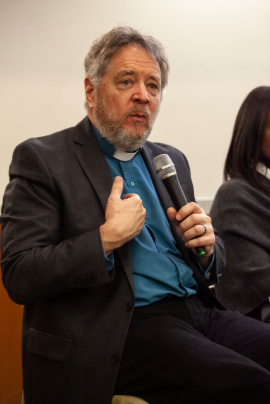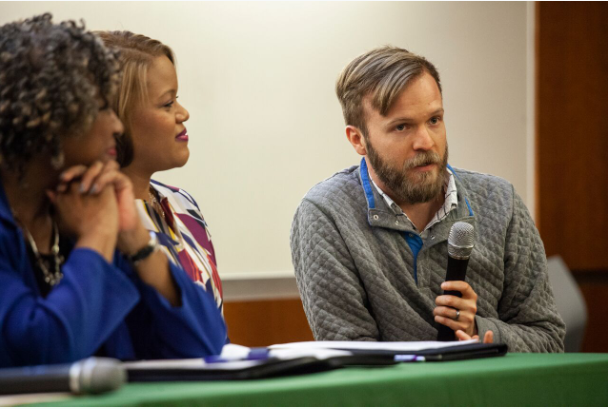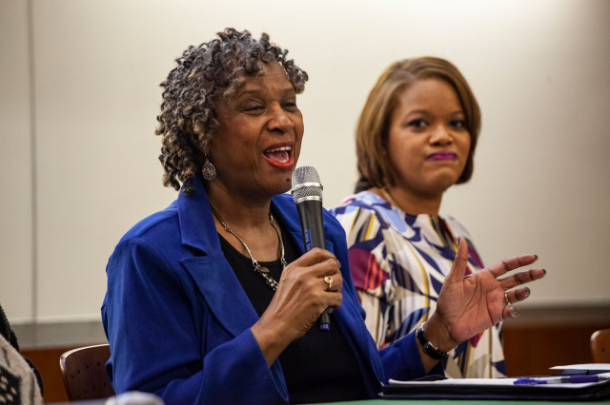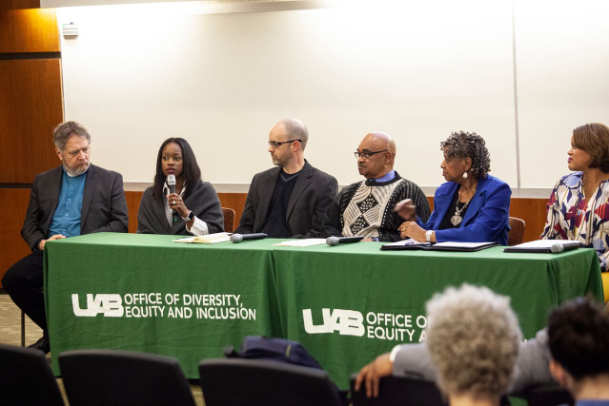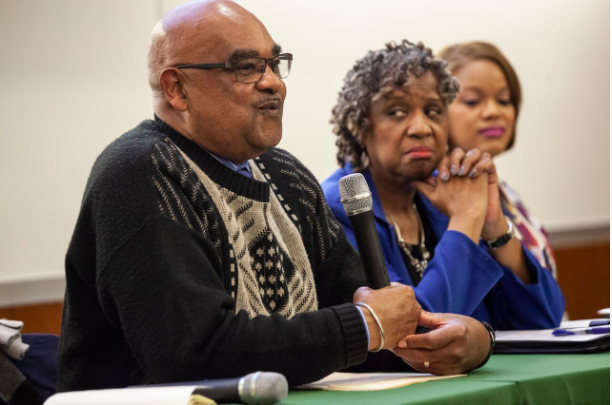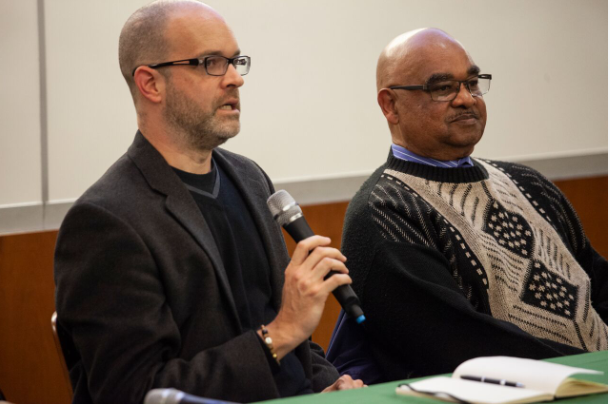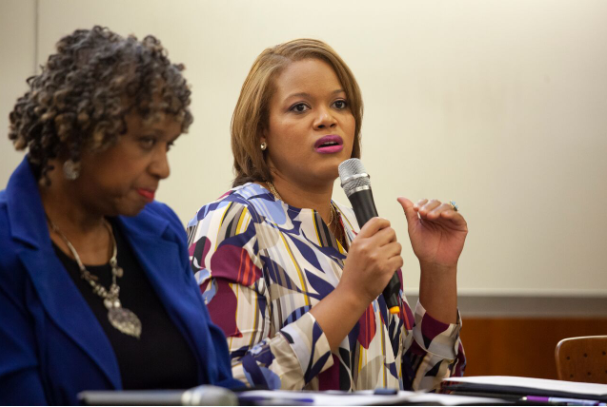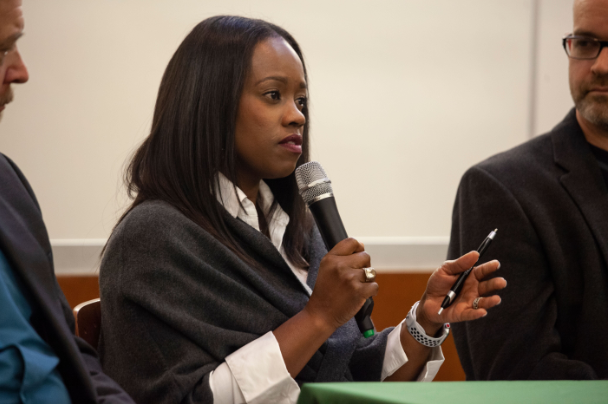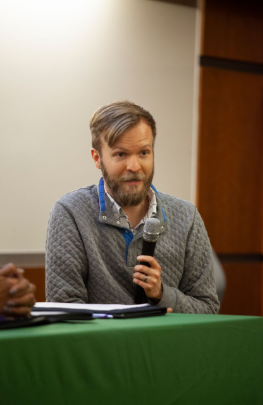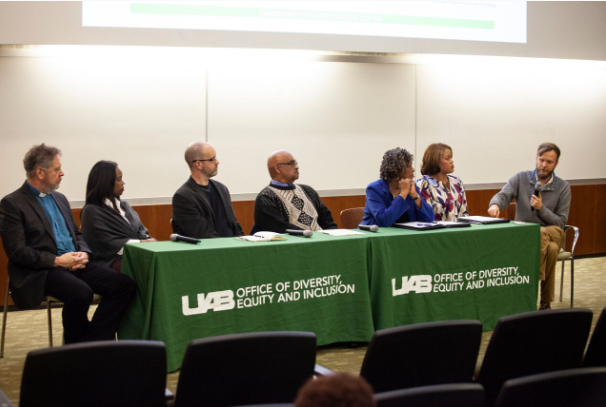
By Je’Don Holloway Talley
For the Birmingham Times
Kameron Pugh, pastor of Iron City Church in Birmingham, holds services at 5 p.m. on Sundays, instead of the traditional 11 a.m. hour favored by most churches. One reason he does that is to overcome what Civil Rights legend the Rev. Dr. Martin Luther King called “the most segregated hour” of the week.
King once said that at “11 o’clock on Sunday morning, when we stand and sing, … we stand at the most segregated hour in this nation,” but Pugh believes the church can be a place where all people can gather in harmony.
“We are a congregation of about 350 people between the ages of 18 and 35 years old,” said Pugh. “[We’re] pretty young, but I think there is an openness with the younger generation [for inclusion]. There is more desire to see unity across a simple vision and know that the church should be [that] way.”
Pugh recently spoke during Critical Conversations, a social program facilitated by the University of Alabama at Birmingham (UAB) Office of Diversity, Equity, and Inclusion (ODEI). The initiative was developed for students, staff, and citizens to discuss topics with faith-based groups in the community, said UAB Assistant Vice President for Campus and Community Engagement, Brandon L. Wolfe, PhD, who also works with the ODEI.
Promoting Healthy Dialogue
Critical Conversations includes panel discussions about pop culture, current events, charity, social justice, politics, systemic conditions, and socioeconomics.
“It is our hope that by creating these types of conversations [we can] promote healthy dialogue, … find common ground, and, more importantly, share ideas and resources to solve societal problems with the goal of building a beloved community,” Wolfe said.
Last week’s discussion focused on community engagement and activism among churches and faith-based institutions; it was titled, “Between Charity and Social Justice: Community Engagement Among Faith-Based Communities, Part 1.” The seven-member panel was moderated by Magdalena Szaflarski, PhD, an associate professor in the Department of Sociology at the UAB College of Arts and Sciences, who asked about King’s “most segregated hour in America” statement.
“I’m one of the old heads,” said retired UAB professor Horace Huntley, a member of Birmingham’s Sixth Avenue Baptist Church. “I lived in the Wenonah area, and we couldn’t go to church in Midfield because they only had white churches. … There are some exceptions, … but most of us would probably agree [that] we’re still grappling with the question of diversity within our congregations. There’s a real need to look very closely at that and determine why that, in fact, is still the case.”
David Barnhart, pastor of Birmingham’s St. Junia United Methodist Church, said black and white churches can have differences in messages: “A lot of times, black folks in predominantly white congregations feel more vulnerable [in those spaces], … especially if the white pastor never talks about [issues like the controversial deaths of blacks, such as] Freddie Gray, Trayvon Martin, or Tamir Rice.”
Gray, 25, died while in the custody of the Baltimore Police Department; Martin, 17, was fatally shot by George Zimmerman in Sanford, Fla.; and Rice,12, was shot and killed by a Cleveland, Ohio, police officer.
“When you have that silence over racial issues, … it says a lot,” Barnhart said. “I think that silence is hurtful. Frankly, a lot of white pastors and congregations want to be colorblind instead of being truthful. … I think those two things are a large reason of maintenance of that status quo.”
Gentrification
Eva Melton, pastor of The Firm Foundation in Avondale, said gentrification can be a challenge.
“Many times, Christianity has been used to colonize and gentrify,” she said. “Often, … charity is the mindset, … [and there isn’t a] social-justice mindset. While charity is needed, a dependency [can be created] that is not best for the community [being served].”
Needs of the Community
Critical Conversations panelists also talked about the needs of the community. Ty Moody of The Worship Center (TWC) Christian Church, which has campuses in Bessemer, Birmingham, and Anniston, said, “The community has more needs than resources, … and we have to align some of those needs with the vision of the ministry.”
Moody pointed out a TWC ministry, “HUB: Honor God, Unify Communities, and Build People,” which ensures that “the things we’re called to do and the things we’re sowing into are aligned with our actual calling as a ministry.”
Voting and Legislation
Debra Blaylock of Birmingham’s Faith Chapel Community Church said congregations can create change through voting and legislation.
“We don’t have enough people voting, and I think that’s where our pastors should come in,” she said. “They shouldn’t tell people who to vote for, but I think they should always encourage people to vote, so we can have an impact on the social issues that plague our communities.”
Pugh said it’s about being on the front lines.
“I think churches that profess to follow Jesus and his model of love and go out of the way to care for the marginalized, the oppressed, those who are cast out into society … have to be on the front lines,” he said. “We’ve got to excel more, … wake up some of our people who are slumbering and not seeing the needs of their neighbors around them.
“The church has been the taillight and not the headlight on these issues, and that must change. The problem is, the church has always been good at perpetuating the problem and not the solution.”
Click here to read more stories about UAB: ODEI; Paulette Dilworth; Keystone Fellows; BMEN.


